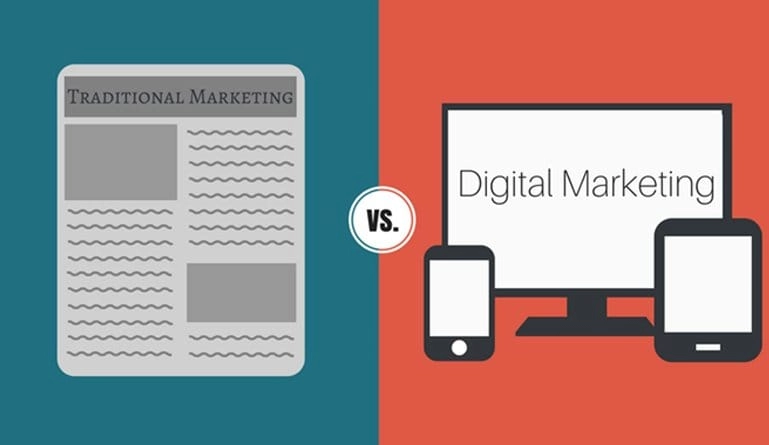In this war between digital and traditional marketing, the former seems to be winning.
Looking at marketing patterns over the last decade, digital marketing has clearly pushed to the forefront. When it comes down to a choice between digital versus traditional, marketers have slowly but surely turned away from traditional platforms in favour of digital marketing.
Between 2018 to 2023, digital ad spend in the US is expected to increase by 85%. That’s because consumers are increasing their screen time, and it is a trend that is only predicted to continue. It is no wonder marketers are turning to digital platforms to achieve their marketing goals.
But why exactly is digital marketing winning the popularity race? And what does this mean for marketers?
Before we take a look at the consequences this has on marketing, it is best to understand what the differences are between the two.
Benefits of digital marketing

Digital marketing has risen to the top in recent years due to many reasons. For one, it offers a higher ROI as compared to traditional marketing, in part due to the potential for engagement. With traditional marketing, it tends to be a one-way communication channel where audience feedback is slow or cannot be collected. Furthermore, digital platforms provide options (e.g. share button) where it is easier for the audience to pass around a particular piece of content — traditional platforms do not offer this option.
It should also be mentioned that digital platforms are a lot more flexible as they allow changes to be made on the spot, whereas the content in traditional marketing cannot be easily updated. It may take days for news to reach consumers.
Another thing to take note of is the reach of traditional marketing. While it is great for connecting with your local audience, if you desire to broadcast your content to an international audience, traditional marketing has its limits. This is where digital marketing excels in.
Additionally, digital platforms also allow marketers to sort out their targeted audience based on their location, interests, purchase history, recent site activity, and many other factors. This ability to filter out different consumers allow marketers to tweak their strategy to be even more specific to the group that they are targeting, ensuring a higher rate of success.
Benefits of traditional marketing
That being said, ttraditional marketing provide certain factors that digital marketing do not. Although digital marketing encourages two-way communication and is a much more cost-efficient method, there are aspects where traditional marketing beats out its digital counterpart.
For one, traditional marketing is a much more personalised approach. This is as traditional marketing generally involves a real person-to-person relationship. On the other hand, digital marketing can feel less personal because of how digitalized everything is, particularly if things are automated or assisted by any other kind of AI software or programme such as a chatbot. This is a pretty common sight to see on most websites today.
Research has also shown that it is easier for our brains to process and recall the information that we read in print. In fact, neuroscientists overwhelmingly agree that the benefits of reading from paper shouldn’t be dismissed lightly.
One study used eye-tracking technology and EEG to measure ease of understanding, persuasiveness, and attention in people exposed to ads on paper and on a digital medium. They found that content on paper is 21% easier to understand and that people reading paper ads are 70% more likely to remember the company which placed the ad.
When we put this in business terms, it’s evident that people are more likely to remember your offer if they’ve actually held a piece of paper promoting it. Although most of us are used to reading off screens, it can’t be denied that physical material engages with our spatial memory networks more than its digital counterpart. It also produces more brain responses connected with internal feelings, which suggests greater “internalization” of the ads. Since it involves more emotional processing, this may help memory and brand associations more than digital marketing is able to. Not to mention, traditional marketing is also easier to implement.
Content creation for each platform
Writing for traditional marketing can therefore differ a lot from writing for digital marketing. For one, marketers have to make sure that the content they write for traditional platforms are up-to-date and as accurate as possible since the content cannot be changed once it is published.
Consider also the type of audience that is more likely to engage with traditional platforms. These generally come from the older demographic, which means that the type of content you write may have to be altered towards their preferences.
There are also points to consider when writing for digital marketing. As the best channel to reach gen-Z and millennials, content on digital platforms has to stay fresh and trendy.
In recent years, numerous studies have reported on the potential impact of smartphone use on different aspects of cognitive functioning, particularly in terms of attention span. This means that the content written for digital marketing has to be short, to-the-point, yet attention-grabbing. We can see this manifest in how paragraphing in articles have become shorter in order to accommodate to the increasing number of mobile users (longer paragraphs will look more cluttered on phones and lose the reader’s interest!). Therefore, it is vital to understand not only how your content has to be adapted to the platform you use, but its intended audience as well.
What type of marketing should you choose?
At the end of the day, it is important to remember that it isn’t always one or the other. Both methods can go hand-in-hand with each other, and may even perform better. By digitally sharing traditional campaigns, you can take your offline marketing and promote it online.
Since both digital and traditional marketing has their own benefits, implementing a strategy that uses a blend of the two will inevitably bring about greater results. Wondering what kind of digital and traditional marketing strategy you should adopt? Contact MIU and transform the way you think about marketing today.






 Branding
Branding Digital Strategy
Digital Strategy PR & Communications
PR & Communications